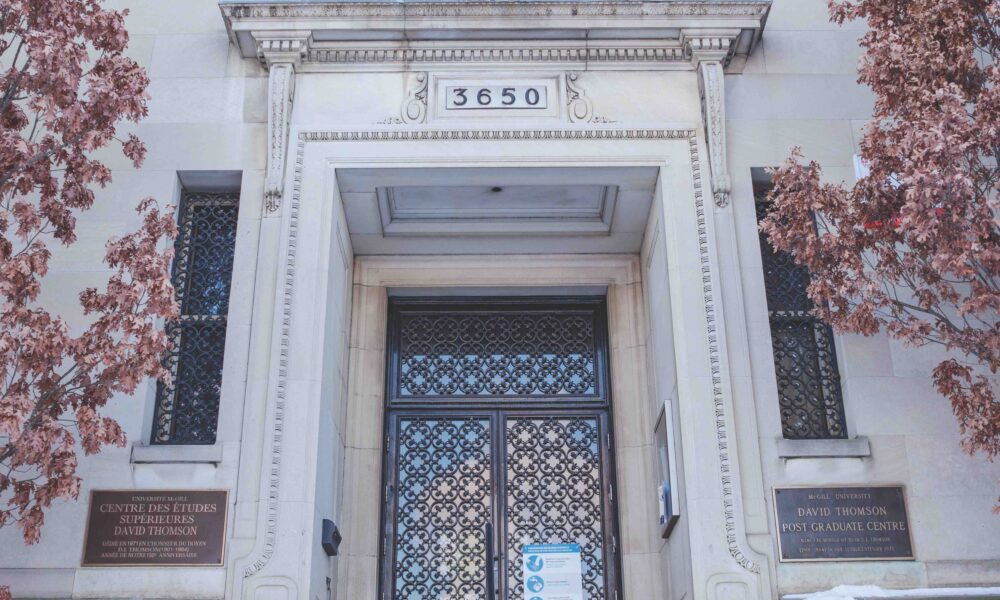McGill’s Post-Graduate Students’ Society (PGSS) held its first virtual council meeting of the Winter 2022 semester on Jan. 12. Secretary-General Kristi Kouchakji announced the society’s efforts to improve COVID-19 safety standards for graduate students, such as distributing higher quality masks in graduate-student work areas. Councillors also discussed possible ways to distribute the pool of money from the now-defunct Legal Support Fund, and heard a presentation from the McGill Trainees’ Poverty Observatory on how to make the Faculty of Medicine’s harmonized stipend policy more equitable.
With the imminent return to on-campus learning on Jan. 24, Kouchakji noted that the PGSS is working closely with McGill facilities to add more mask dispensers in graduate school buildings and work areas.
“I’m also very excited to say that we are in the early stages of organizing access to some higher quality masks for our members,” Kouchakji said. “N-95s, KN-95s, KN-94s, and any other mask-related PPE that you might want to use on campus can be put in the recycling bins, so that’s very exciting.”
The requirements to enter buildings such as The PGSS Thomson House—which will soon require proof of three vaccine doses for entry—were also discussed. Councillors then spoke about the continuation of online extracurricular activities for the foreseeable future.
Financial Affairs Officer Sophie Osiecki held discussion with various councillors regarding best how to distribute the funds accrued from the Legal Support Fund. The society ceased collecting student fees for the fund as of Fall 2021. Osiecki advocated for putting the funds—which total approximately $125,000—toward McGill’s Need-Based Bursary Program. Councillors offered other suggestions, such as subsidizing the society’s legal protection plan, donating the money to the McGill Wellness Hub, or contributing it to the Society’s Special Projects Fund. In the end, they decided to postpone the verdict, encouraging members to send in their ideas via email for how they want the funds allocated.
The society’s final topic for the evening regarded a presentation by Morgan Maher, a third-year Philosophy PhD candidate, on behalf of the McGill Trainees’ Poverty Observatory—a group of student trainees from various departments advocating against student poverty. Maher’s presentation recounted a number of recommendations the Observatory has brought forward to the Faculty of Medicine regarding their Stipend Policy, including raising stipends. This Stipend Policy is intended to provide complete tuition and fee coverages, standardized living allowances, and a standardized policy on scholarship Top-Up awards for all thesis-based graduate students in the Faculty of Medicine.
Maher acknowledged that the policy is a step in the right direction for improving living standards for graduate students, but that it fails to address student poverty. According to Maher, the Harmonized Stipend Policy does not account for inflation and increasing costs of living. Even in 2019, when the policy was originally written, the living stipends were insufficient in providing students with enough money to live above Quebec’s poverty line.
During the question period following Maher’s presentation, a representative from the McGill Biology Graduate Student Association (BGSA) detailed how Biology Graduate stipends can be deducted if students are also working as a teaching assistant (TA).
“It is written in the [Department of Biology’s] contracts […] that TA pay can be deducted from stipends, meaning that, in some cases, you are actively punished for TA-ing,” the representative said. “It’s creating situations where some people working in the same lab are being paid drastically different amounts.”
Upon learning of the deducted TA wages, Kouchakji announced, “I am really mad, and I am going to close my microphone and keep yelling at the walls now.”
Soundbite:
“Deducting TA wages or [research assistant] wages from your funding is not acceptable, it is a form of wage theft,” said Kouchakji in response to the BGSA representative. “Doing it specifically with TA wages is actually a violation of the AGSEM collective agreement [….] This is not meant to be happening and the new funding letter template, when it was given out to [graduate program directors], made it explicitly clear that you cannot do this, as per the terms of the AGSEM collective agreement.”
Moment of the Meeting:
Students from other departments, such as Languages, Literatures, and Cultures, aired frustrations about how their living stipends are inadequate for paying McGill’s tuition. Kouchakji detailed how, in her program, Communication Studies, students begin to receive lower stipend payments after four years of graduate work at McGill, effectively penalizing them for continuing in the program and doing research under the McGill name.









A standardized minimum graduate funding package that includes tuition, living costs adjusted for inflation is much needed across departments at McGill, especially for International graduate students who need pay International fee supplement for three residency semesters.